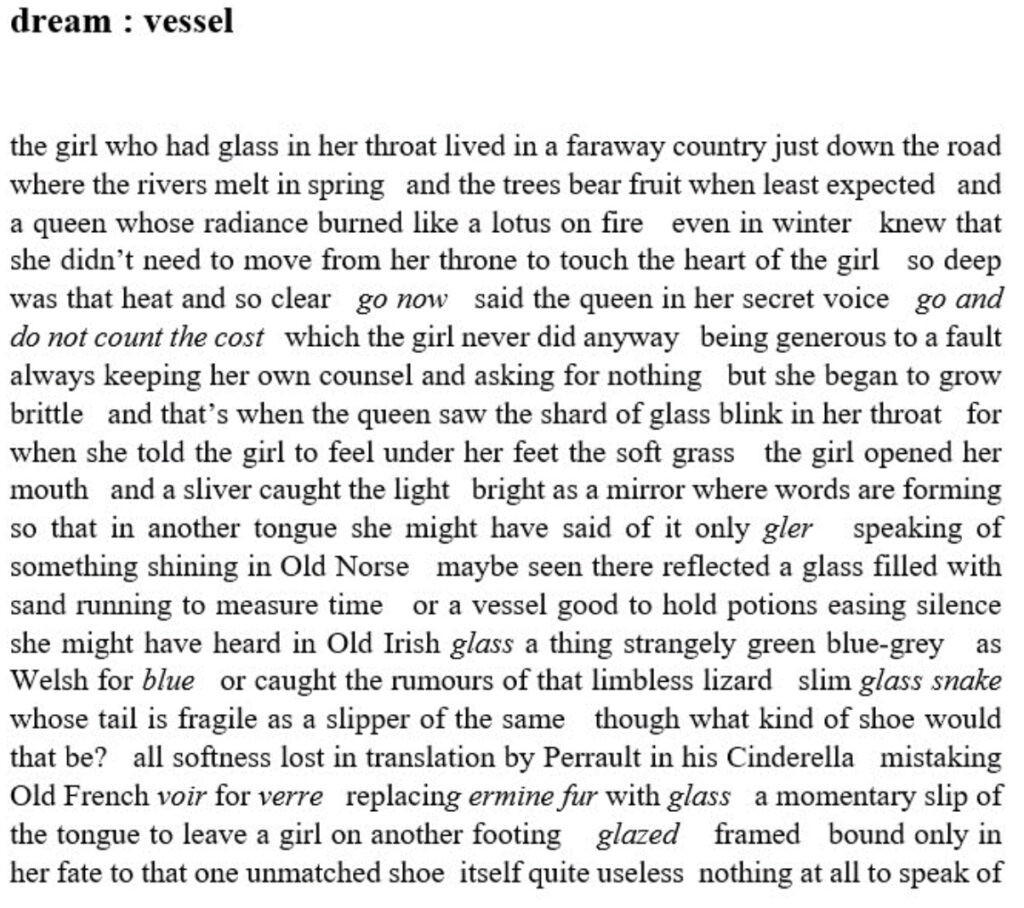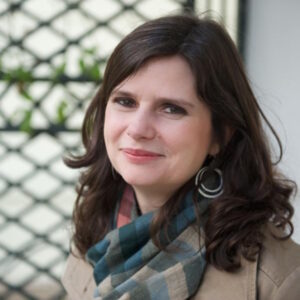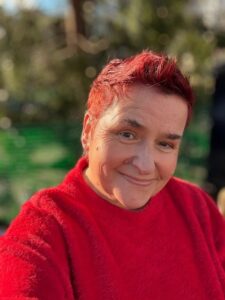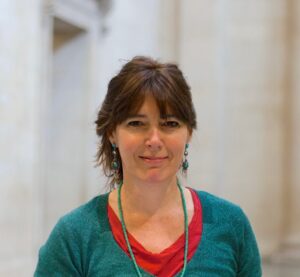Café Writers Annual Poetry Competition is now Closed
2024 Winners
We are proud to announce the results of the 2024 Café Writers Poetry Competition followed by a report from judge John McCullough:
First Prize goes to Esther Morgan
Polishing the Glasses
At the end of each silver-service shift
we laid up the tables for next day’s guests
bundling the stained tablecloths into our arms
like nurses stripping the beds,
replacing the soiled napkins with wings of linen
we’d carry on folding in our sleep.
My task was to take each thin-stemmed wine glass –
still streaked with dishwasher salt –
and twist it over a bowl of steaming water
until the surface misted like a bathroom mirror
on a winter morning, or as if I were catching
the breath of a ghost
before wiping the fog of evidence away
with a soft cloth we saved for the purpose.
There was something in that rhythm
of mist and polish – the dining room’s hush
like the moment after snow –
which, even at the time, seemed closer
to ritual than chore – a communion of air
as I lifted glass after glass up to the light
the lips and fingers of those we’d waited on
un-printing themselves from the touched world.
Esther Morgan’s four poetry collections are published by Bloodaxe Books. Her third, Grace, was shortlisted for the 2011 T. S. Eliot Prize. Born in 1970, she grew up in rural Worcestershire. She began writing poetry seriously during a stint as a volunteer at the Wordsworth Trust in Grasmere before arriving in Norwich to do an MA in Creative Writing at the University of East Anglia. Since then she’s been involved in the poetry world as an editor and teacher and is on the Advisory Board for The Rialto magazine. She currently lives on the Norfolk/Suffolk border and works as Communications Manager for Norfolk Museums Service.
Second Prize goes to Laura Mckee
the mail never gets delivered to the right place in this town
– for Suzanne Pleshette’s unrequited crush on Tippi Hedren in The Birds
perhaps you might just arrive one day fresh off the long pretty road that hugs the bay
obviously I’ll have been busy in my garden
rose dirt leaving a Technicolor smear across my cheek
casually answering all of your questions like I’m your shoeshine boy
hearing you say you’re leaving already
I could lie face down right here on the steps never reaching my door
Laura McKee‘s poems have been published widely including in The Poetry Review, The Rialto, and Under the Radar. Fourteen poems magazine accepted her first officially queer submission recently, and now her second officially queer submission has won second place in The Cafe Writer’s Competition! Her pamphlet, take care of your hooves darling, was published by Against the Grain Press in 2023. As a first generation student she achieved a Distinction in her MA with The Poetry School and Newcastle University.
Third prize goes to Lesley Sharpe

Lesley Sharpe teaches literature and writing in London. A finalist in the Mslexia 2023 Single Poem competition, placed for this year’s Café Writers’ and shortlisted for Aesthetica, London Magazine, Live Canon and Bridport prizes, her poems, reviews, stories and essays have appeared in journals and anthologies, most recently Katherine Mansfield and London (Edinburgh University Press, 2024), Finished Creatures, Mslexia, The Alchemy Spoon and Tears in the Fence.
The Norfolk Prize goes to Cai Draper
On Beinn Sgritheall
for Gboyega Odubanjo
A poem can try to be a signal, and I know you’ve got the conch
to the side of your face. My toes are swelling little cherries
at the fraught back door, having fed the distance. Once again
I committed to a long and difficult journey and made it a circuit.
Fanfare for scree. The fearful gust-banshee yanking my pack off
welcomed me intimate with a madness. As the mountain vanished
from under, I could only cling to the tufts. I’ve never been
more alive with my vertigo and eyes wide open, calling names.
It is likely that in life I tried harder than this to reach you,
you with your ludicrous clarity and weather totally brightening.
You were with me but not in the country. I have a silly faith
in the memory. And if it fades, it will be because when the eagle
capped us at the spire, I knew it was itself and you were elsewhere,
real and safe, thumping people’s biceps and raising up your voice.
Cai Draper is a poet from South London living in Norwich. He has had pamphlets published with Bad Betty Press and Broken Sleep Books, and works as a counsellor for young people.
Commended Poems:
Chris Rice
Smudge
…the moon-cat,
smudgeless white,
you would have liked today,
curled up in the autumn sun,
a wedding cake of fur,
or sitting stiff and upright
like a chef’s hat on the lawn,
green eyes dark and scowling
not at me but something
moving in the trees
behind my back:
a stranger in a white coat
with flipchart and syringe;
a parrot with a cracked beak
trying to yawn …
Briefly, you return to me;
close your eyes and press
your cold dry nose
against my hand.
I stroke the fur between
your ears – the smudge of
night that disappeared
when you were still a kitten;
leave you on your favourite rug,
porcupined with needles;
drive your empty basket home
and see you everywhere:
a white bag on the kitchen floor,
a white towel on the landing,
moonlight thistling
windows with your hairs.
Ken Evans
St. Sebastian of the Warm Urine
Dawn is a blind rising on frayed
cord in front of my windscreen,
a car flying to the light, a booster
seat by me, where baby’s lips pop.
Velocity feels like a halo, offset
by a need to pee, and nothing for it
but an old plastic Red Bull bottle
below the cuckooed passenger seat.
Unscrewing the top, one-handed,
to post a piss of a thousand feet
through a trapdoor from a wonky
garden sprinkler, one fist cups
the soft brains of my genitals,
the other, steers the middle lane.
I think of all the relationships
that got away from me and when,
even as I know my sleeping baby
loves her daddy, and mummy
at home OK with it, according
to her probation officer.
The arrows to my bladder,
an agony-ecstasy of release,
police in a mirror, the Red Bull
fizzing at blood temperature.
Bridget Khursheed
Mary in bits
If we tied down all the pieces of you
Mary: the patten shoe in the bog,
the lace scrap plucked from the edge
of the door, the mother of pearl
prayer case left on a chapel
ledge. If we put them back together –
dégradé – how big would you be?
Forget the marmalade, forget the ship,
ladies in waiting, gulls, forget destiny.
Francis. Rizzio. Bothwell.
Are you? Are you? You?
Oh, a little French embroidery, wit,
intrigue unpicked across the whole
tangle, soothe it with red hair
and lake escapes. Oh, and those boats
you have sat in dropping the things
you loved – helped by odd currents
to an inevitable rendezvous –
picked up by herds or milkmaids
or beneath the plough endowed by
the very same blade that cuts.
If we had all the pieces of you, Mary?
Rich men’s lettering, small patten shoe
in the bog, lace scraps, sunlit hills
you rode across to Hermitage Castle
and the river estuary. Undo each dark shadow
pierced and stitched in your honour.
Would the knots still hold? Or fly away?
Natalie Perman for ‘Argus’
Honourable Mentions:
Kate Fenwick for ‘Gag Reflex’
Amy Rafferty for ‘The Dust of distant Comets’
Nairn Kennedy for ‘Bells’
Dillon Jaxx for ‘I dreamed that dream again’
JUDGE’S REPORT



